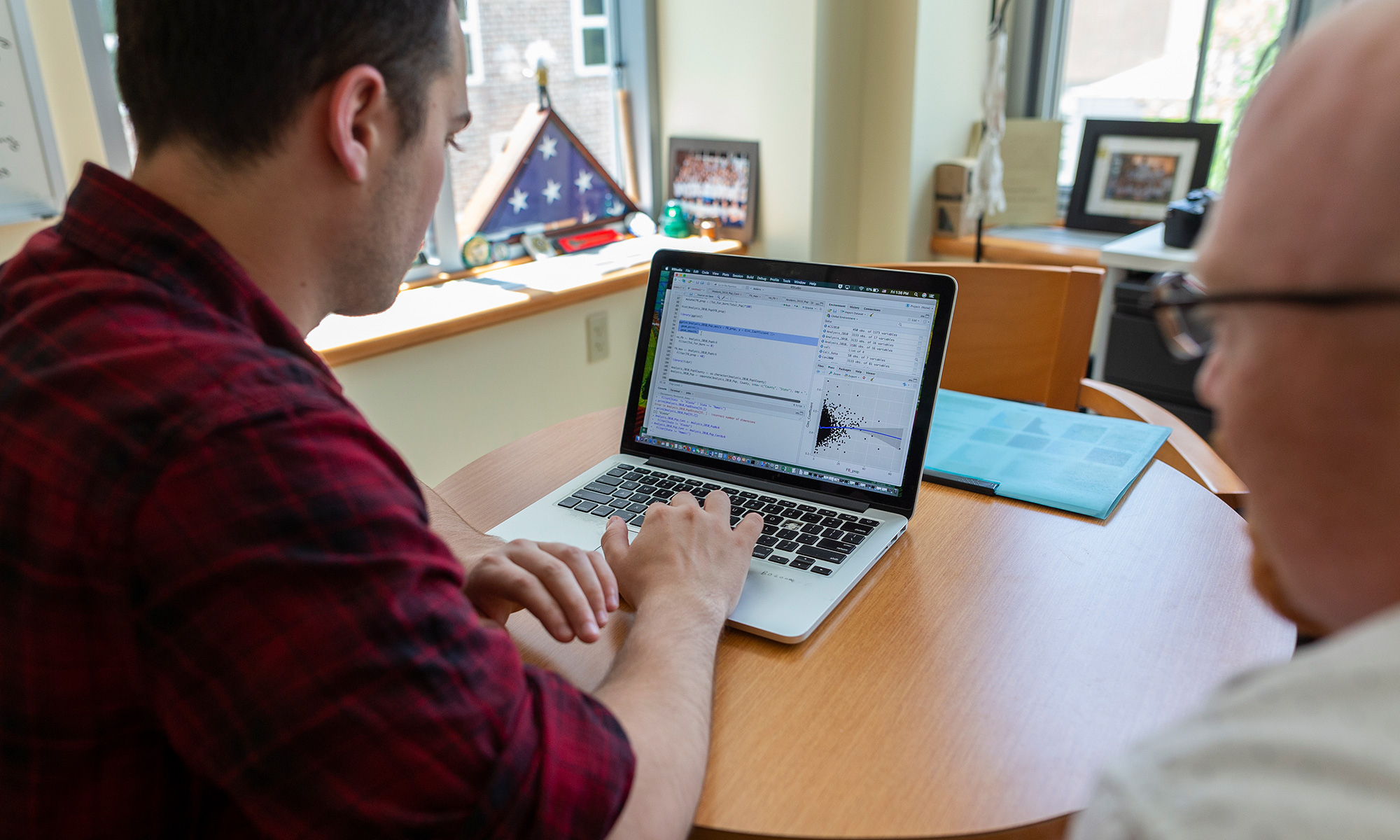One of the most indispensable members of the Denison men’s club hockey team never shot a puck, saved a goal, or tallied an assist.
Jill Reiner ’22, however, provided data-driven analysis of those statistical categories and many others for a grateful coach who used the information to make in-game adjustments.
“We can’t replace her,” Denison hockey coach Jeff German said. “There’s a giant hole with her leaving.”
Reiner has taken her love of sports and the lessons she’s learned in the university’s burgeoning data analytics program and parlayed them into a dream job with the Toronto Maple Leafs of the National Hockey League.
While German can’t use Reiner as a recruiting tool for his team, the academic department that helped launch her career certainly can. Laura Boyd, the director of Denison’s data analytics program, has shared the story of Reiner’s success with students considering enrollment in one of the university’s fastest-growing majors.
Even before Reiner landed a job as a research and development analyst with the Maple Leafs, she brought national prominence to the school in 2021 as a collegiate-level winner in the NFL’s Big Data Bowl. Reiner not only earned a $5,000 prize but was interviewed by multiple media outlets, including the Expected Value Podcast.
“I send the link to Jill’s interview, and I hear kids say, ‘this is awesome — this is exactly what I want to do,’” Boyd said.
Not just in the field of sports, either. The university’s data analytics program, founded in 2016, is placing graduates into corporate, nonprofit, and public-sector jobs.
A booming data job market across industries
The explosion of data and the need for those who can build predictive models and communicate the findings have never been greater. The U.S. Bureau of Labor Statistics has projected that employment of data scientists and mathematical science occupations will grow 31.4% from 2020 to 2030.
Analytics is used in everything from financial institutions looking to expose fraud to public health departments trying to combat global pandemics to ride-share companies deciding which car to dispatch and what route it will take.
“Every single aspect of our lives has some sort of data involved in it now,” said Nicholas Morton ’19, who works in the marketing/analytics division at Macy’s. “Marketing has turned into a numbers game, and everything is data-driven. Right down to when it’s the best time to send out an email to consumers.”
The history of data analytics at Denison
Denison was among the first liberal arts colleges to offer data analytics as a major, and it’s proved to be a prescient decision — one that other universities are attempting to replicate.
The program, with its roots in mathematics and computer science, is Denison’s sixth most-popular major. It had 173 students at the end of the 2022 spring semester.
“The data analytics program at Denison has prepared me extremely well for any type of work, as I’ve not only learned to analyze all different types of data, but to think critically and thoughtfully through every situation,” Reiner told the university last year after her NFL Big Data Bowl triumph.
Boyd and Michael Brady, the outgoing associate director of data analytics, knew there was interest in the discipline when they began formulating the curriculum. They had hoped to attract about 40 candidates to the major over the first four years, but much to their surprise the program’s first graduating class in 2019 boasted 25 students.
“We knew there was a huge opportunity in the marketplace,” Brady said, “and that there was no reason why a small liberal arts institution should cede that ground.”
Brady and Boyd believed a data analytics program would mesh nicely with Denison’s overall educational approach, which promotes critical thinking, creative problem solving, storytelling, and autonomous learning. It’s an adaptable major, allowing students to leverage what they are also learning in the arts, humanities, and social sciences.
Designing an interdisciplinary curriculum
Data analytics majors at Denison don’t just spend four years designing algorithms and honing math skills. There’s an emphasis on clearly communicating their work and ethically collecting, analyzing, and interpreting the data.
Students are required to choose three classes of interdisciplinary work in a field of interest such as psychology, biology, philosophy, economics, environmental studies, anthropology, and sociology. They also can submit an individual plan to include such fields as sports analytics.
Morgan Hogenmiller ’19 has a passion for the arts, and she used her data analytics degree to land a summer internship in New York with a theatrical management company.
“My senior project was to study how long a Broadway show usually stays in New York before it has to close, and how a company can make the show successful,” said Hogenmiller, who’s pursuing her master’s degree at Carnegie Mellon University in Pittsburgh. “After completing my senior project, I realized it’s something I would love to do for my career.”
Hogenmiller, Morton, and Reiner became data analytics majors after taking an introductory course in it. Unlike some universities, the introductory class in Denison’s program, which is project-oriented, doesn’t require first-year students to have any experience with computer science or statistics.
Reiner quickly realized the data-driven field could provide her with a pathway to a career in hockey, a sport she loved growing up in New York.
“I took it in the second semester of my freshman year and had absolutely no idea what I wanted to do as a career at that point,” Reiner said last year. “That was the class that really drew me into the data analytics major.”

